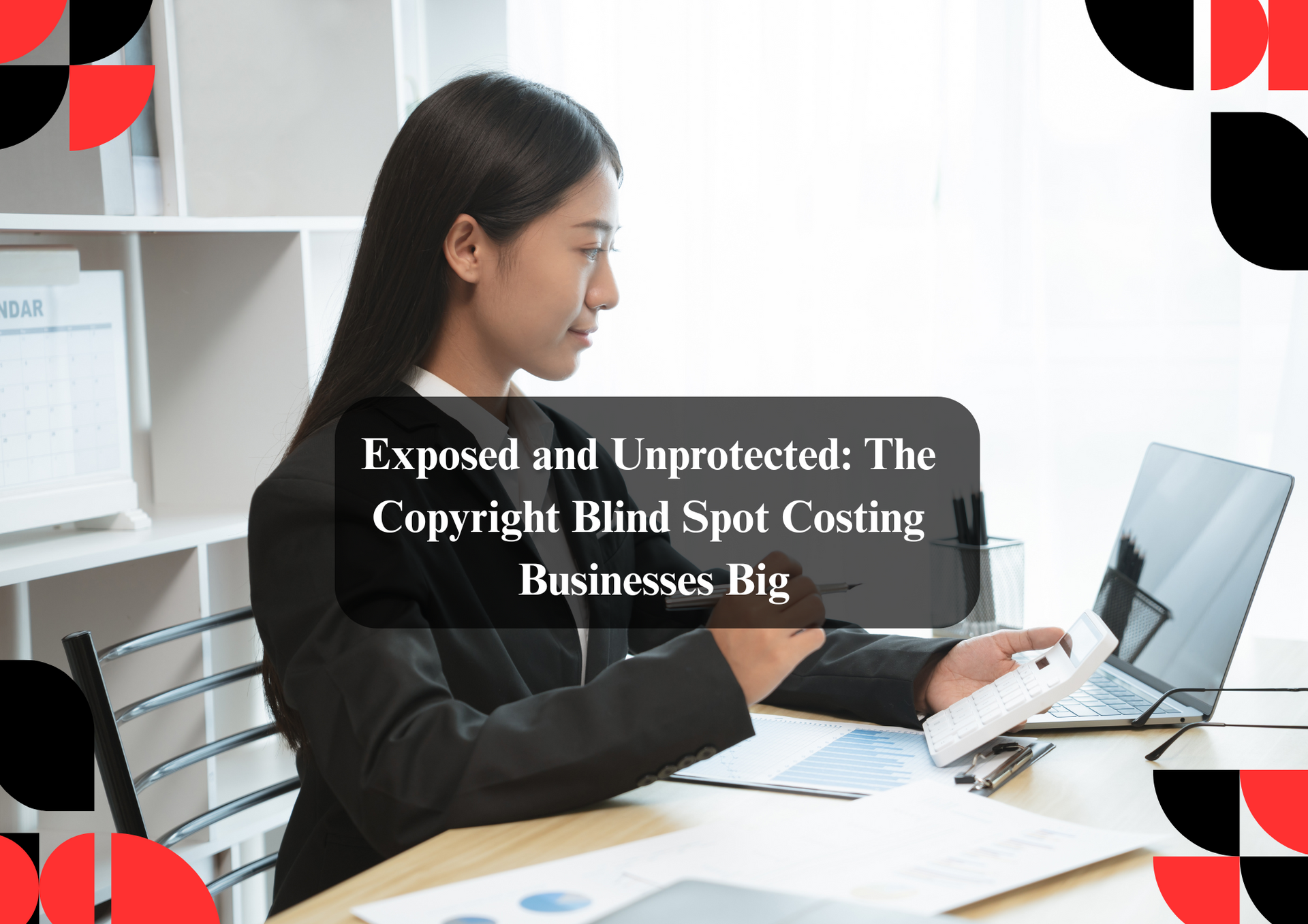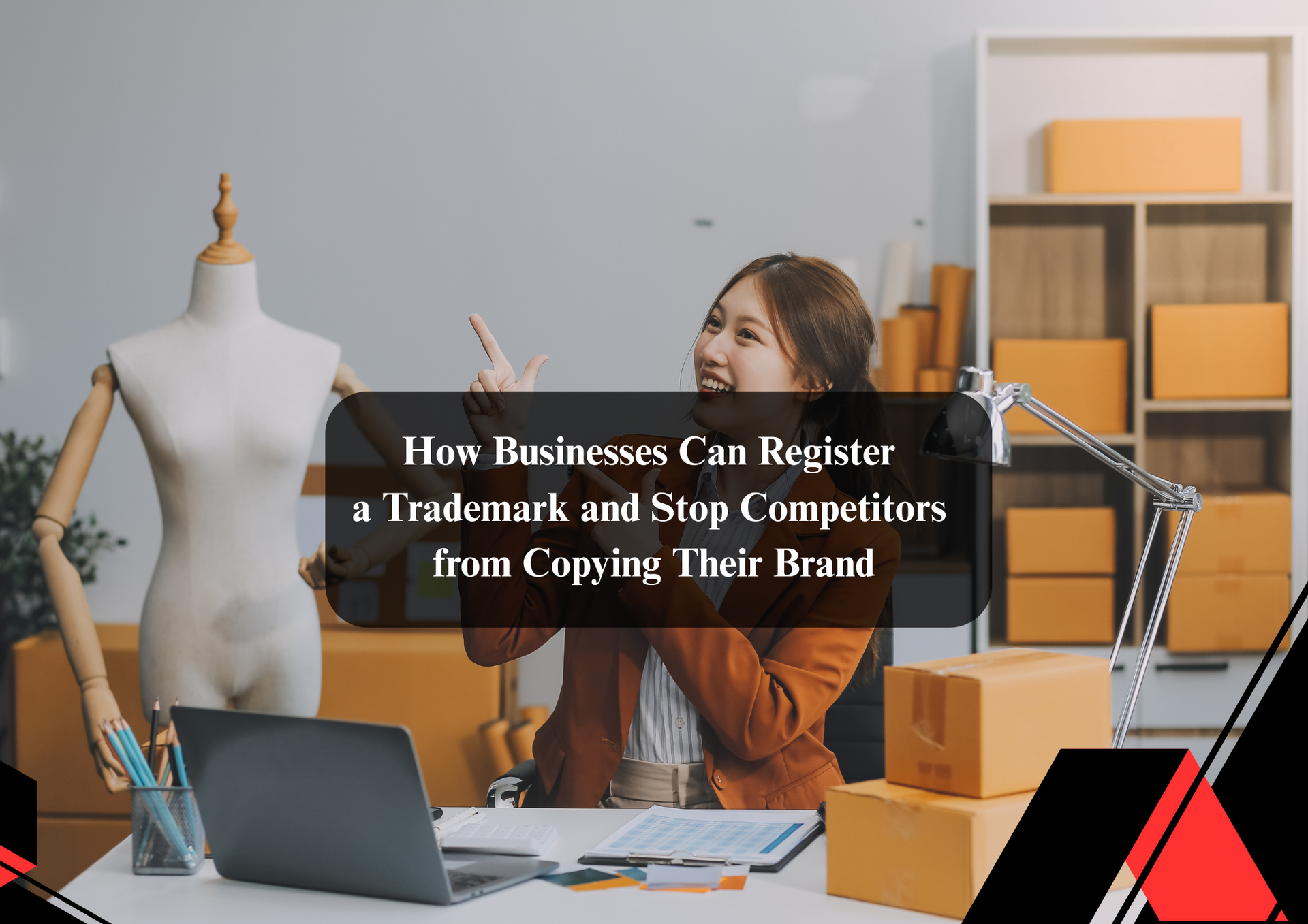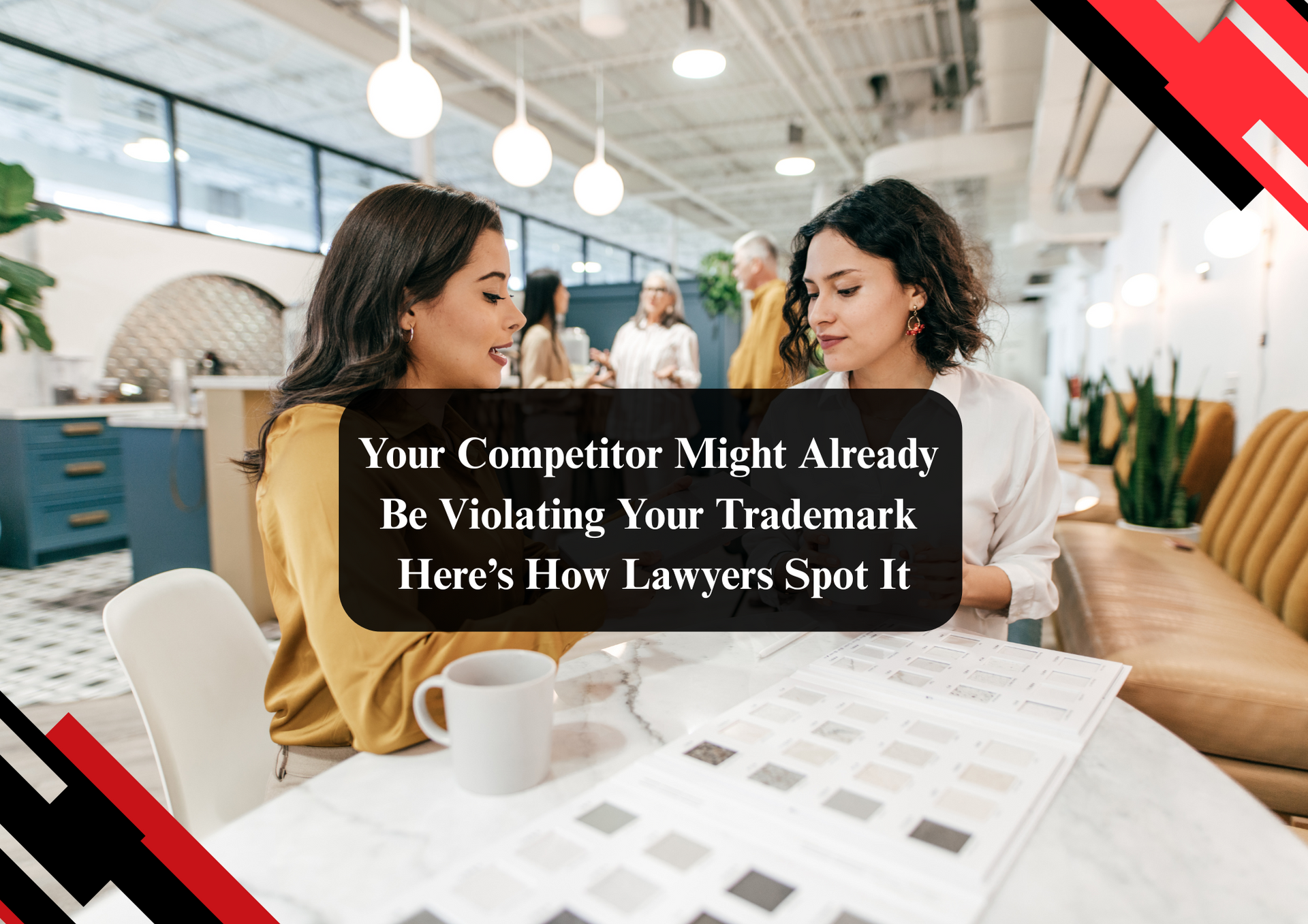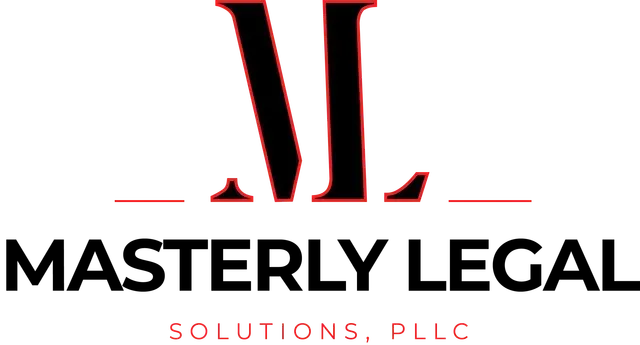When Someone Uses Your Work Without Permission, Here's What Copyright Infringement Lawyers Do Next
The Reality of Unlawful Use
Imagine discovering your creative works—a song, design, photograph, or even computer software—published online without your consent. Whether for private financial gain or commercial advantage, unauthorized use of your content can damage your brand, cost you revenue, and threaten your control as a creator. This is copyright infringement, and it’s more common than most people realize.
When this happens, you need more than outrage. You need action. That’s where copyright infringement lawyers from Masterly Trademarks step in to defend your intellectual property rights.
Understanding Copyright Infringement
Copyright infringement occurs when someone violates the copyright owner's exclusive rights under federal law, such as reproducing, distributing, or displaying copyrighted material without permission. These exclusive rights are protected by the Copyright Act and extend to:
- Original works fixed in a tangible medium
- Artistic works, sound recordings, and audio recordings
- Literary content, software, and derivative works
- Public distribution and reproduction rights
Infringement can be accidental or committed willfully—but either way, it's illegal and actionable.
What Copyright Infringement Lawyers Do First
Once you hire a copyright attorney from Masterly Trademarks, our first goal is to assess the validity of your copyright claim. That starts with verifying your copyright registration, because in most cases, only a registered work can be enforced in federal court.
If you have a valid copyright, we immediately move to:
- Investigate the source of the infringement
- Determine whether the use qualifies under fair use or other exceptions
- Document the scope and significant part of the copyrighted work that was used
This early-stage investigation is critical to building a strong case.
Collecting Evidence of Infringement
Copyright attorneys meticulously gather proof of infringing acts. Whether it's screen captures, social media posts, or unauthorized listings on e-commerce platforms, the evidence must show that your rights were violated.
We also evaluate whether the infringer benefited financially. Under federal law, this matters because if the act was for commercial advantage or private financial gain, you may be eligible for:
- Statutory damages of up to $150,000 for willful infringement
- Recovery of attorneys fees and court costs
- Orders to stop further use and demand removal
Sending a Cease-and-Desist Letter
Once infringement is confirmed, the next step is usually a cease-and-desist letter. This legal notice gives the infringer a formal warning and a chance to stop without escalation. These letters are tailored to reflect:
- Your copyright registration details
- The copyright notice originally affixed to the work
- A deadline to remove the content or face legal consequences
Often, this first step is enough to resolve the issue without entering litigation.
When Litigation Is the Only Option
If the infringing party refuses to comply or continues unauthorized use, our team moves forward with a legal claim. Filing a copyright lawsuit in federal court involves:
- Proving ownership and a valid copyright
- Demonstrating unauthorized use
- Showing the use is not protected under fair use provisions
The courts then decide whether the use infringed on your exclusive rights and what damages apply. Our attorneys handle every part of this process—filing, negotiating, arguing, and protecting your stake.
Holding Infringers Accountable
When infringement is proven, you may be awarded:
- Actual damages based on financial harm
- Statutory damages if the work was registered before infringement
- Attorneys fees in some cases, especially if the infringement was willful
Our copyright infringement lawyers fight for the maximum compensation and long-term protection of your work.
Not Every Use Is Fair Use
Some infringers claim fair use to justify their actions. However, fair use is limited. Courts look at:
- The purpose and character of such use
- Whether the use was commercial or educational
- How much of the work was used
- The effect on the market value of the original
Masterly Trademarks challenges unfair claims of fair use and defends your legal position with facts and precedent.
Handling Online and International Infringement
Many copyright violations happen across borders, especially in the Asia Pacific region and other international markets. Our lawyers understand the Berne Convention, which gives copyright protection to U.S. creators in over 170 countries.
We also deal with internet service providers, e-commerce sites, and hosting platforms to:
- Submit takedown notices
- Enforce licensing terms
- Block access to copyrighted work used without permission
Our goal is always to stop misuse swiftly and legally.
Understanding Your Rights as a Copyright Owner
As a copyright owner, you control how your work is used, reproduced, displayed, and sold. You can grant licenses, transfer ownership, or enforce restrictions.
Hiring a copyright infringement lawyer ensures you:
- Enforce those rights when they’re violated
- Avoid liability by proactively managing your IP
- Take steps to protect other assets like trademarks or trade secrets
We help you take full command of your IP rights, not just react when they're abused.
Copyright Registration Isn’t Optional
Without copyright registration, you're limited in what you can do legally. You may not be able to:
- File a lawsuit
- Collect statutory damages
- Recover attorneys fees
- Create a public record of ownership
Registering your work with the copyright office is the first step to protecting your creations. Our attorneys handle obtaining registration for new and existing works.
Masterly Trademarks Covers the Full Spectrum
Whether you’re protecting a business, artistic portfolio, or entire digital platform, our legal team at Masterly Trademarks provides:
- Enforcement strategies
- DMCA takedown support
- Litigation and settlement negotiation
- IP audits for companies and individual clients
We serve a wide range of creators, including:
- Authors
- Developers
- Photographers
- Startups
- Content creators and influencers
No matter the size of your business or the scope of your portfolio, we offer legal tools that keep you in control.
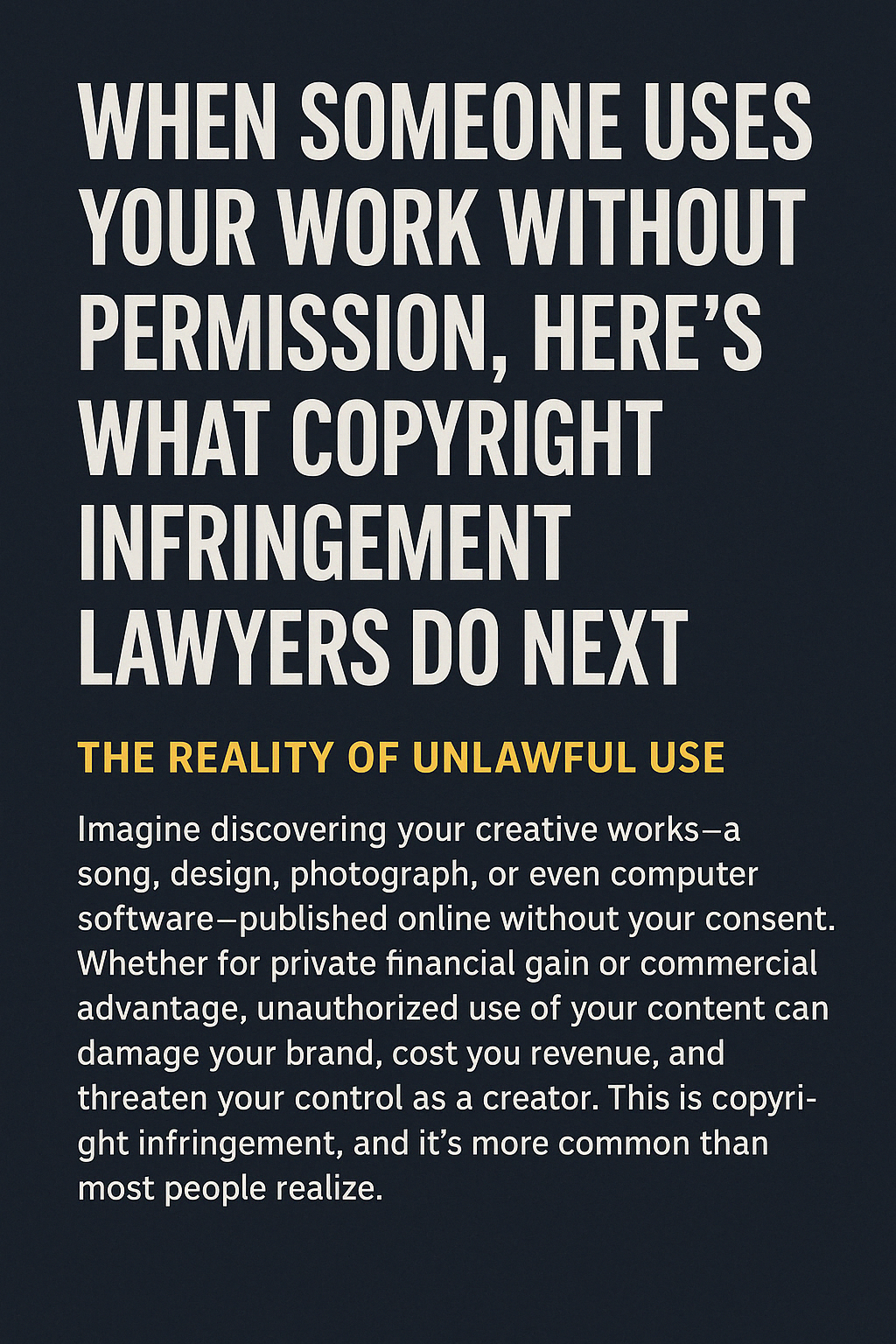
Don’t Wait for Infringement to Get Worse
The longer you wait to act, the harder it becomes to prove infringement and claim damages. Evidence may disappear, infringers may become harder to reach, and financial loss can grow.
By hiring copyright infringement lawyers early, you strengthen your case and boost your chance of success. Let Masterly Trademarks guide you through every stage of protecting your copyrighted material.
How Copyright Law Protects Rights Holders in Real Cases
When someone misuses your original work, copyright law gives you the power to respond. Whether you're a business, artist, or content creator, you are legally recognized as one of the many rights holders protected under both U.S. statutes and international agreements. Understanding your position under the applicable law—including the Copyright Act and relevant treaties like the Berne Convention—is crucial to enforcing your rights effectively.
At Masterly Trademarks, we don’t just rely on theory—we build strategies grounded in real-world copyright cases. Our attorneys analyze case precedents, assess how the law applies to your situation, and develop an action plan that maximizes your ability to claim damages and stop further infringement.
What Is Copyright Infringement Registration?
When you make something like a story, song, or picture, it’s yours. Copyright infringement happens when someone else uses it without asking. To help keep your work safe, you can sign up for registration. That means you tell the law, “This is mine!”
It helps stop others from copying your work.
How to Avoid Copyright Infringement
If you want to use someone else’s work, like a song, picture, or story, you should ask first. If they say “yes,” then it’s okay. If not, you can’t use it.
You can also make your own work instead. That way, you know it’s yours!
What Is Copyright Infringement?
Copyright infringement means someone uses your work without asking. To break the rules, these things usually happen:
- You made something (like a story, song, or drawing)
- Someone else used it
- They didn’t ask you first
If someone does that, it’s not fair—and it’s not allowed.
How Long Do You Have to Tell?
If someone uses your work without asking, you have a few years to tell a grown-up or a lawyer. That time is called the statute of limitations. It means you can’t wait too long to say something.
If you wait too long, it might be too late to fix it.
What Is the Copyright Infringement Act?
The Copyright Infringement Act is a rule that helps protect people’s work. If someone uses your work without asking, this rule says it’s not okay.
It helps make sure your songs, stories, pictures, and videos stay safe and belong to you.
Navigating Meta Copyright Infringement: What Classifications Could Mean for Your Legal Case
When your creative work is used without permission on Meta platforms like Facebook or Instagram, it may qualify as a case of meta copyright infringement. Lawyers often begin by analyzing how the content was shared, who shared it, and whether the platform took proper measures to prevent unauthorized use. The term may refer to internal classification codes or legal indexing used to document the stage or severity of an infringement case. Copyright infringement lawyers will typically send a DMCA takedown notice, gather evidence of original ownership, and escalate the case through formal legal channels if Meta fails to act responsibly. Understanding how your case fits into potential categories like can streamline enforcement and increase the chances of successful resolution.
Organizations That Protect Music Copyrights: Understanding the Process
When someone uses your music without permission, copyright infringement lawyers often collaborate with an organization that protects music copyrights to initiate the legal process. These organizations—like ASCAP, BMI, and SESAC—play a vital role in monitoring unauthorized use, issuing licenses, and enforcing legal rights. The term may refer to an internal tracking or classification system used by these organizations or law firms to categorize the severity or type of infringement. Once a violation is flagged, lawyers and rights organizations work together to pursue takedowns, negotiate settlements, or initiate lawsuits to protect your intellectual property and ensure you're compensated.
Copyright and Trademark Registration: The First Line of Legal Defense
Registering your creative work through copyright and trademark registration is one of the most effective ways to protect your intellectual property. Copyright safeguards original works like music, art, writing, and video, while a trademark protects brand elements like logos, slogans, and business names. Both types of registration provide legal proof of ownership, which becomes critical if someone uses your work without authorization. When infringement occurs, lawyers rely on these official registrations to take swift legal action—such as issuing cease-and-desist letters, filing DMCA takedown notices, or pursuing damages in court. Having your work properly registered strengthens your legal position and ensures that your rights can be fully enforced under federal law.
Filing a Copyright Registration Application: Securing Your Creative Rights
The copyright registration application is the first formal step in asserting legal ownership of your original work. This application, filed through the U.S. Copyright Office (either online or by mail), requires details about the creator, the nature of the work, and the date of creation. Applicants must also submit a copy or deposit of the work and pay a registration fee. Once processed, the registration not only affirms your rights but becomes a powerful tool should infringement occur. Copyright infringement lawyers often begin enforcement by referencing the registration to prove ownership and pursue legal remedies like takedown notices or financial compensation. Filing early can make all the difference in protecting your creative legacy.
Understanding the Copyright Registration Process: Protecting Your Work from the Start
The copyright registration process is a crucial step in legally safeguarding your original work, whether it’s music, writing, art, photography, or digital content. In the United States, registration is handled by the U.S. Copyright Office. The process involves completing an application, paying a filing fee, and submitting a copy or sample of the work. Once approved, you receive a certificate of registration that serves as legal proof of ownership. This official status becomes vital when your work is used without permission, giving copyright infringement lawyers the legal grounds to demand takedowns, seek damages, or pursue lawsuits. Early registration not only strengthens your legal position but also allows you to claim statutory damages and attorney fees in court.Speak with Copyright Infringement Lawyers Who Know How to Protect Your Work
When someone uses your work without permission, you're not powerless. At Masterly Trademarks, our team of copyright infringement lawyers is ready to take action and help you protect what you’ve created. From enforcement to litigation, we handle it all.
Contact us at (972) 236-5051 to schedule your free consultation. We’ll answer your questions, review your case, and help you take control of your rights before infringement does more harm.
Your creativity is valuable. Let us help you fight for it.
You might also like
